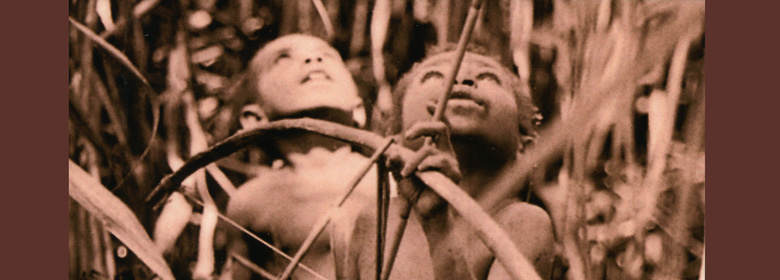Chapter 15. A Story of Years-Ago
Famine
Note: We are now in the central mountains of
New Guinea. Gwe is translating for Alan as the young anthropologist is
doing field work. At this moment Gwe is bringing to Alan's house in Divanna
(Gwe's home village) the young woman he loves and her adoptive father to
tell their story.
The following
day, Monday, Alan was in his house, sitting on the ground with his portable
typewriter before him, typing a letter on bond onionskin to his academic
sponsor in New York: detailing the ecological investigations in Divanna,
when Gwe called from outside and Alan called out, “Come in.”
He entered with
a timid glow on his face, his broad lips curved up in an involuntary smile.
He was followed
by Willow, shy and proud in her bearing. And she was followed by an older
man, small in stature, with a homely face and dusty looking, but proud.
The three entering at once startled Alan. Gwe was aware of this and he
began, “There is a story for you...”
“OH,” said the
anthropologist, who removed the onionskin from the little white typewriter
and inserted a new sheet with carbon paper. He was going to type the story
as he heard it. He stood, went to the luggage shelf in back, and gave the
man, Garavok, a pinch of honorific salt.
Garavok graciously
accepted, seated himself, and ate with a formal demonstration of pleasure,
taking in air between his lips with a sipping sound three times.
Garavok began
to speak and Alan heard that Garavok had a cleft palate. As Willow was
the person who understood him best, she spoke to Gwe and Gwe translated
for Alan. Alan typed in English. Garavok sat, wearing his red feather headband.
Around his shoulders a slightly worn net bag hung. His waist was adorned
with a darkened cane waistband no longer handsome.
He spoke, pausing
for Willow to interpret. In precise tones she told his story.
“I was young,”
he said, “when the drought came. The ground was dry and cracked, and nothing
would grow. I saw starving people walk along the paths and people die on
the road. My sister and I lived near the river, away from the road. We
had a field of sweet potatoes, little ones and just a few. Not enough for
us to eat too long, and we hid them with brush. A baby girl was brought
to us. She had no mother.
“When there
is drought we go into the next valley. It is hotter and lower, near the
Om River. There are many trees the men do not cut. They eat nuts and hunt
wild pigs. If we went, we would have enough to eat, and we would live,
but the baby would die. Babies get malaria and die near the Om River. Our
relatives went, but we stayed. I remember how the little girl asked for
food. One by one we took out the sweet potatoes from our field and mashed
them in water and gave them, to the baby to eat. We only ate roots from
the taboo vines from the forest and kimkima grass, and what we could find.
“We planted
a new field, new potatoes began to grow, and we grew the child. After a
long time there was rain, the ground grew grass, and the potato vines grow
again, big. We lived.”
“I was the little
girl,” said Willow, and she burst into tears. She said, “I have taken Garavok’s
name instead of my family’s. I will always stay with him.”
Gwe looked at
her and she saw tears in his eyes, of which he seemed proud. Thought Willow,
“I like this man.”
|

